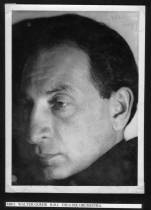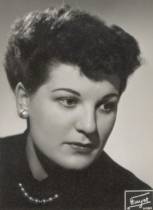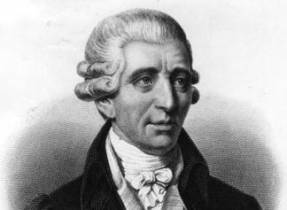
Info about Walter Goehr 
Teresa Stich-Randall
Born: December 24, 1927 - New Hartford, Connecticut, USA
Died: July 17, 2007 - Vienna, Austria
The admired American soprano, Teresa Stich-Randall, briefly attended the Gilbert School in Winsted. She also studied at the Harrtt School of Music in Hartford at the time and at 15 left New Hartford as the youngest student at the Columbia School of Music. Later, a Foolbright Scholarship took her to Europe, where she learned German, French and Italian for her roles in the opera. She learned to sing in five languages. In 1947 Teresa Stich-Randall made her operatic debut as Gertrude Stein in the premiere of Thomson’s The Mother of Us All in New York. She was chosen to create the title role in Luening’s Evangeline in New York in 1948. She then was engaged to sing with Toscanini and the NBC Symphony Orchestra in New York. After winning the Lausanne competition in 1951, Teresa Stich-Randall made her European operatic debut that year as the Nermaid in Oberon in Florence. This established her reputation in Europe, and it was in Europe that most of her subsequent activity was centered. In 1951-1952 she sang at the Basel Opera. In 1952 she made her first appearance at the Salzburg Festival and at the Vienna State Opera. In 1955 she made her debut at the Chicago Lyric Opera as Gilda. From 1955 she appeared regularly at the Aix-en-Provence Festivals. In October 1961 she made her Metropolitan Opera debut in New York as Fiordiligi, remaining on its roster until 1966. Teresa Stich-Randall also sang widely in the USA and Europe as concert artist. Her success in Vienna led her to being the first American to be made an Austrian Kammersängerin in 1962. She retired in 1971 (Baker) or 1980 (AMG). Outside of much-heralded visits home to West Hartford in 1982 and 1983, she has been little heard from since.
Helmut Kretschmar
Born: February 3, 1928 - Kleve (Niederrhein), Germany
The German tenor, Helmut Kretschmar, studied first in Frankfurt a.M. with Kurt Thomas and Hans Emge, then at the Musikhochschule of Detmold with Fred Husler. In 1953 he received the 1st Prize with the singing competition of the Deutschen Musikhochschulen (German Colleges of Music), and in 1958 the Big Art Prize of the Country North-Westphalia. In 1954 Helmut Kretschmar worked in Hamburg Broadcast in the premiere of Arnold Schoenberg’s Moses und Aron. In 1960 he became lecturer at the Musikhochschule Detmold, since 1961 served there as a Professor. In 1953 he began his career as concert and oratorio singer, which led soon to beautiful successes. At the Berlin Festival Weeks and at the Bach Festivals of Lüneburg and Heidelberg of the years 1960-1962 he showed himself as a great Bach interpreter. He participated in the Göttingen Händel Festival and undertook concert tours all over the world. Thus he could be heard in concert halls in Berlin, Düsseldorf, Köln, Paris, Madrid, London, Bombay, in cities of India, Korea, the Philippines and Sri Lanka. Helmut Kretschmar concentrated his artistic work primarily on the work of J.S. Bach, but was successful in oratorios of Georg Frideric Handel, Felix Mendelssohn, J. Haydn and in works of modern masters. He became a Lieder singer by his wife, the pianist Renate Fischer, who likewise was a Professor at the Musikhochschule Detmold, and accompanied him in Lieder recitals. They performed, among other things, Lieder of Schubert, R. Schumann, Hugo Wolf and Debussy. Helmut Kretschmar was admired for his rich tenor voice, the artistic expression and the fine intimate style. He can be heard on numerous records of Marken Columbia, Decca, DGG, L'Oiseau Lyre, Vox, Philips, Discophiles Français and Edition Schwann. Among them are also some opera recordings (Fidelio, Moses und Aron by A. Schoenberg), although he did not make an operatic career. In the first place however stand works stand like Matthäus-Passion (BWV 244), Weihnachts-Oratorium (BWV 248) and the Mass in B minor (BWV 232) by J.S. Bach, Missa Solemnis by Beethoven, Die Jahreszeiten by Haydn and the Mass in A flat major by Schubert.
Erich Wenk
Born: 1923 - Königsberg/Ostpreußen, Germany
The musical gifts of the German bass, Erich Wenk, showed up very early, when he sang already six years in boys’ choir. After many years of studies Erich Wenk turned for short time to the stage singing. However, he decided then to dedicate himself completely to activity on the concert podium. He started to make reputation for himself particularly by broadcast concerts, in which he performed frequently works of J.S. Bach. In 1957 he undertook a German tour together with Erna Berger, Gertrude Pitzinger and Walther Ludwig, and the quartet performed the Liebesliederwalzer of Johannes Brahms. The artist had then important successes at the Bach Festivals of Lüneburg and Heidelberg and at the Göttingen Händel Festival. During 1960-1962 he participated in the Festival Weeks of Berlin. He gave concerts in the music centres of the Europe, including Amsterdam, Basel, Bordeaux, Brussels, in the Cathedral of Chartres, in Göteborg, Copenhagen, Stockholm, in the Leipzig Thomas Church, in Madrid, Paris and Zürich. He excelled primarily as a great interpreter of J.S. Bach in his Passions and Cantatas. However, his repertoire covered in addition an abundance of works by Georg Frideric Handel, Haydn, Mozart, Beethoven, Verdi, Felix Mendelssohn, and in addition, compositions of modern masters. At the same time he was an important Lieder interpreter. In 1969 Erich Wenk received a teaching job in the Musikhochschule of Köln. Erich Wenk’s voice can be heard on many labels: on Ariola Eurodisc (Matthäus-Passion (BWV 244) of J.S. Bach), on Concert Hall, Vox, L'Oiseau Lyre (Bach Cantatas), on Wergo (La Resurrezione of G.F. Handel) and other labels. On Nonesuch he sang the role of the Minister in Fidelio.

Franz Joseph Haydn The Seasons, H 21 no 3 Teresa Stich-Randall, soprano Erich Wenk, bass Helmut Kretschmar, tenor NDR Symphony Orchestra and Chorus Walter Goehr
1956 |

